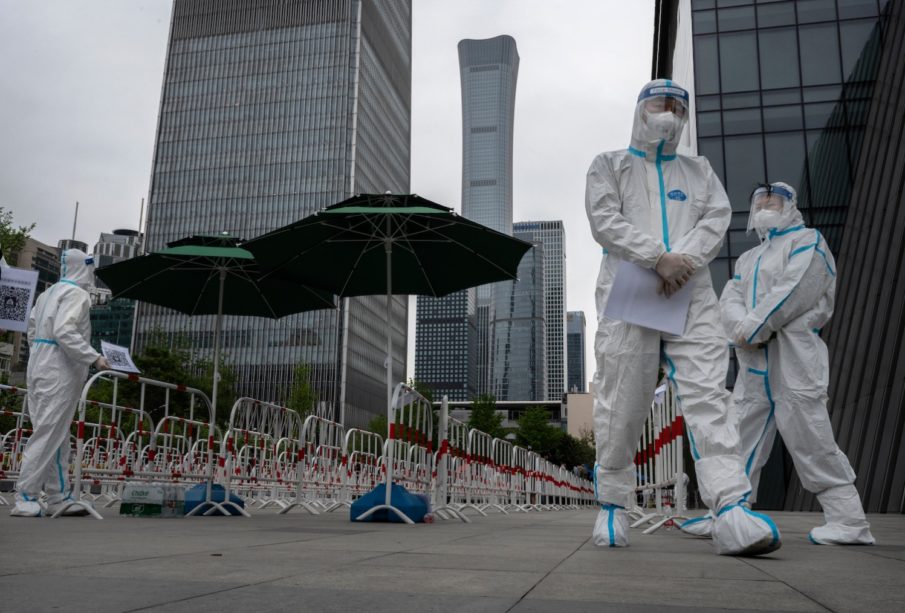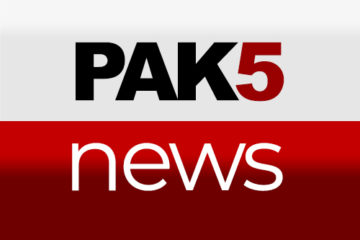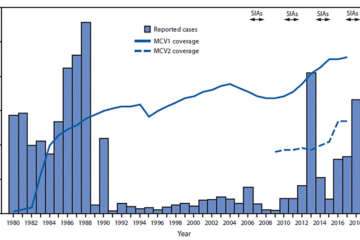Who Profits From China’s Zero-COVID Strategy? – Foreign Policy

Who Profits From China’s Zero-COVID Strategy?
As Beijing braces for possible lockdown, the leadership shows no sign of changing course.
Health workers wear protective suits as they wait to register office workers for COVID-19 tests in Beijing on April 27.
Welcome to Foreign Policy’s China Brief.
The highlights this week: China’s leadership sticks to the zero-COVID policy as Beijing braces for lockdown, why Shanghai’s public anger won’t translate into protest action, and a terrorist attack strikes Chinese interests in Pakistan.
If you would like to receive China Brief in your inbox every Wednesday, please sign up here.
Welcome to Foreign Policy’s China Brief.
The highlights this week: China’s leadership sticks to the zero-COVID policy as Beijing braces for lockdown, why Shanghai’s public anger won’t translate into protest action, and a terrorist attack strikes Chinese interests in Pakistan.
If you would like to receive China Brief in your inbox every Wednesday, please sign up here.
Why Is China Sticking With the Zero-COVID Strategy?
Beijingers are bracing for lockdown as the number of COVID-19 cases in the capital rises. The latest new daily figure is just 92 cases—a fraction of those in Shanghai—but Beijing is especially paranoid about the spread of the coronavirus, thanks in part to the leadership’s own fears. After witnessing the lockdown experience of hungry Shanghai residents, those in Beijing have swept supermarkets clean and ordered extra supplies while it’s still possible.
Both Beijing and Shanghai are undergoing new rounds of mass testing; some residents report mandatory daily testing. Shanghai is in its fifth week of total lockdown, although case numbers have now gone down for several consecutive days, and authorities are lifting some restraints for individual residential compounds.
However, the decline in cases does not represent a chance at a victory against COVID-19 like the one China accomplished in April 2020 after the initial outbreak. In February and March 2020, the official number of new daily cases nationwide never passed the low thousands. This time, Shanghai alone has recorded between 15,000 and 25,000 cases a day. The 2020 data may have been understated, but the omicron variant presents a whole different ballgame.
In the near term, China’s COVID-19 strategy remains playing whack-a-mole with outbreaks and facing weeks to months of shutdowns when one gets out of hand. There are several reasons why the government won’t change course. One is the relative weakness of Chinese-made vaccines and the low vaccination rate among the very elderly. Another is the political sensitivity for Chinese President Xi Jinping after two years of trumpeting the zero-COVID strategy as a personal achievement, as well as a Chinese Communist Party (CCP) success.
A likely understated factor is the institutional weight of the organizations that handle COVID-19 restrictions throughout China. The whole-of-society efforts and volunteerism—mixed with considerable state power—that characterized the 2020 response have been largely replaced by personnel tasked from other government institutions, from health care officials to police. There are also new groups created specifically for COVID-19 control. (For a comparison, think of the agencies that mushroomed after the 9/11 attacks in the United States.)
For many local officials, the pandemic has reduced the wide range of metrics once used to measure their success to a single number. A new set of responsibilities and opportunities to strengthen personal networks—or benefit from corruption—has emerged. Ending the zero-COVID policy will have a disruptive effect on this ecosystem. Of course, the current situation is stressful for front-line personnel, but it is administrators who hold the power.
The zero-COVID policy has also been a boon to the security state, extending the range of tools and the normalization of surveillance. This comes at a huge cost in time, money, and personnel, but it has made the routine tasks of control that local governments depend on much easier.
For example, one everyday task for local authorities is stopping petitioners—distressed citizens seeking to circumvent local officials—from traveling to Beijing or other centers to complain, accomplished by monitoring train stations or even kidnapping petitioners. The constant pandemic surveillance has made the task much easier. Increased surveillance could be kept in place after the zero-COVID policy ends, but public pushback would be stronger and the costs harder to justify.
Then there is just straightforward cronyism. In Shanghai, accusations of profiteering are all over social media, but that is short-term corruption. The big money comes from opportunities such as the secret deals around testing or the sale of medical equipment, as well as which drugs get approved for usage. Top COVID-19 tsar Zhong Nanshan has promoted products associated with traditional Chinese medicine—a pseudoscience with a dubious safety record—without declaring his own financial interests.
Ultimately, the fate of China’s zero-COVID policy is in Xi’s hands. But there are many people telling him that it’s still necessary—and that there’s a lot of money in disaster.
In a special edition of FP Live, join presidential chief medical advisor Anthony Fauci and FP editor in chief Ravi Agrawal for a conversation about the global response to COVID-19, the war in Ukraine’s impact on the world’s economic recovery, the rise of misinformation surrounding the virus, challenges ahead, and more. Fauci plans to take questions from Foreign Policy subscribers in an interview that will be released at 12 p.m. on May 4.
Subscribers can submit their questions here. Asking questions during FP Live interviews is an exclusive benefit of an FP subscription. Subscribe today to join the conversation.
What We’re Following
Anger isn’t action in Shanghai. Frustration and fear amid the lockdown in Shanghai have surged online, with complaints spilling out beyond censors’ ability to control. A video that movingly compiled audio of Shanghai residents in distress went viral before being abruptly removed. References to “Do You Hear the People Sing?” from Les Misérables, a popular choice among the Hong Kong protesters in 2019, have also proliferated, with some state media employees even posting references—although those were quickly deleted.
Although the outcry is embarrassing for CCP leadership, it’s not the first instance of online outrage in China. The past two years alone have seen anger over the chained woman case and the mourning of whistleblower doctor Li Wenliang. The anger doesn’t last, and it doesn’t transfer to real-world action. Posting online has mild risks in China, but real-life protest has become even more dangerous under Xi. One has to be very desperate or idealistic to take that on.
Terrorist attack on Chinese interests in Pakistan. The University of Karachi’s Confucius Institute—a Chinese state-backed learning center often accused of propaganda—was struck by a terrorist attack yesterday, killing three Chinese tutors and one Pakistani man. The insurgent Baloch Liberation Army (BLA), which seeks independence for Baluchistan, has claimed responsibility. China’s main planned rail and road routes in Pakistan run through Baluchistan, and construction has stirred considerable local anger.
The BLA has officially claimed several attacks against Chinese interests, including the killing of 10 Chinese workers in 2017 and an assault on the Chinese Consulate in Karachi in 2018. Chinese media has tried to paint the attacks as linked to Uyghur movements or wider Islamist terrorism.
Xi’s infrastructure push. A highly publicized meeting chaired by Xi pledged widespread infrastructure investment across China, in everything from supercomputing to green energy. This year is likely to see a ton of government money aimed at boosting GDP growth numbers. Xi is reportedly eager to outgrow the United States, even as analysts downgrade their predictions for China.
However, the details are still unclear, and a lot of the investment—such as the emphasis on artificial intelligence—seems more driven by buzzwords than carefully thought through. China’s economy may be the ultimate reality check for Xi’s ideological ambitions.
Tech and Business
Drone giant ends Ukraine, Russia sales. Chinese drone manufacturing giant DJI has announced it will suspend new sales in both Russia and Ukraine, apparently seeking to dampen accusations of favoring Moscow in the conflict. Many Chinese businesses, from banks to airline parts suppliers, are caught between existing ties to Russia and fears of being seen as an arm of Chinese government policy. China’s anti-U.S. rhetoric over the conflict in Ukraine doesn’t help. DJI’s move will probably slightly favor Ukraine, which has depended on donations of drones from abroad rather than buying them outright.
Musk’s China links. The announcement of Tesla CEO Elon Musk’s $44 billion deal to buy Twitter has raised concerns among many China analysts. Twitter has recently done a stronger job of taking down state-run Chinese accounts and labeling misinformation and propaganda originating from China. That approach may be in jeopardy given Musk’s dependence upon Tesla’s factories in China and his past reluctance to criticize Beijing, even when ties to the U.S. government got him in political trouble there.
Musk’s sometime rival Jeff Bezos has raised the issue publicly. Whether Twitter staff would comply with a change in policy seems uncertain.
May holidays likely limited. China’s five-day Labor Day holiday is likely to see limited travel and economic activity thanks to rising COVID-19 cases, with provinces already issuing warnings against movement. Such warnings will probably have less effect than the widespread reporting of conditions for those trapped in Shanghai’s lockdown, especially those in mandatory quarantine.
Although Labor Day isn’t as important as the Spring Festival or October national holiday, it’s still another economic blow for China’s already pained tourism and holiday industry.
James Palmer is a deputy editor at Foreign Policy. Twitter: @BeijingPalmer
More from Foreign Policy
A destroyed building in Ukraine
Ukraine’s War Has Already Changed the World’s Economy
Global economics will never be the same—but not in the ways you might think.
china-russia-ukraine-war-sebastien-thibault-illustration-foreign-policy-hero
What Lessons Does China Take From Putin’s War?
A month into the invasion, Beijing is still backing Russia.
The Russian and Chinese national flags are seen on the table as Russia’s President Vladimir Putin and his China’s President Xi Jinping stand during a signing ceremony at the Diaoyutai State Guesthouse in Beijing on Nov. 9, 2014.
Opposing China Means Defeating Russia
Moscow’s war isn’t a distraction. It’s part and parcel of the threat posed by Beijing.
Ukrainian President Volodymyr Zelensky, French President Emmanuel Macron and Russian President Vladimir Putin arrive for a meeting on Ukraine with German Chancellor at the Elysee Palace, on December 9, 2019 in Paris.
The Meaning of Ukraine’s Coming Neutrality
History offers clear examples of what neutral status means—and what it doesn’t.
Expand your perspective with unlimited access to FP.








